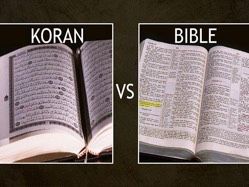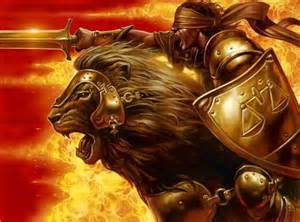Which God would you choose? Learn the difference between the god of the Qur’an and the God of the Bible.
IT’S WORTH CONSIDERING
 The god of the Qur’an and the God of the Bible are in many ways opposites. Here is a brief comparison. According to the Qur’an, the god of Islam, Allah, is impersonal. He created everything, but has no need or desire to interact with any of it. That includes people. He is largely unknowable, but demands the respect of his creation. According to Islamic teaching, Allah cannot love his creation. The reason is that before creation, he was alone. He was one. He was content as one because he was complete and had no need of anything, including love. Since he was alone, there was no one to receive his love or to give him love.
The god of the Qur’an and the God of the Bible are in many ways opposites. Here is a brief comparison. According to the Qur’an, the god of Islam, Allah, is impersonal. He created everything, but has no need or desire to interact with any of it. That includes people. He is largely unknowable, but demands the respect of his creation. According to Islamic teaching, Allah cannot love his creation. The reason is that before creation, he was alone. He was one. He was content as one because he was complete and had no need of anything, including love. Since he was alone, there was no one to receive his love or to give him love.
Since he was and still is complete without us, he has no need (or desire) to love us or be loved by us. Doesn’t that make you want to run out and sign up? This is only one way in which Islam is the opposite of Christianity, but it’s a huge one. One would serve a loving god in a totally different manner than an unloving one. Throughout history, pagans served their gods largely out of fear. They would do anything not to anger the gods. The relationship was detached and impersonal.
AS I SEE IT
It seems logical that man-made religions would never involve a personal relationship with a deity. That would get really messy with all the expectations, accountability, and relationship issues. Just follow some reasonable rules and live your life as you wish. When I think about all the man-made religions, I wonder if we’re giving man too much credit. I’m sure that behind every one is Satan himself or one of his henchmen guiding the thoughts and discussions.
This is especially true of Islam. We must remember that Satan is a corrupter, not an innovator, and in Islam we see the corruption of the core attribute of the only true God. Love. God’s love is the basis of the entire Christian faith. He desires a relationship with those He has created. Knowing that none of us seek after Him, He takes the initiative by drawing us to Himself. Quite a contrast to the god of Islam.
We can learn a lot about the true God’s desire for a relationship by studying His names as revealed in the Bible. Before Genesis 2:4, God reveals Himself as Elohim, the creator who embodies supreme power, sovereignty, and glory. Beginning with this verse, however, we receive the special account of the creation of man and God’s special relationship to man as distinct from the lower creation.
The God of the Bible made man in His own image so He could commune with him. He blesses the earth for the sake of man. In this capacity, God now reveals Himself as Jehovah-Elohim (Lord God). From this point on we see God as all the hyphenated forms of Jehovah that represent the ways He will personally relate to His ultimate creation—man. As Elohim, God revealed Himself through His works (creation). As Jehovah, He became the God with moral and spiritual attributes. Whereas Elohim was powerful, Jehovah becomes personal—the ever-present, self-existing one who never changes, and thus can be trusted in a personal way to keep His promises to His people whom He loves.
While it’s true that the term Elohim assumes His love for His creation, the name Jehovah shows this love as being tied to moral and spiritual attributes. It is as Jehovah-Shalom, Jehovah-Jireh, and all the others that He becomes the relational God who desires that His supreme creation would not only love Him, but enjoy Him.
In Islam, man is no better than the rest of creation. He is simply a part of Allah’s creation and exists only to submit to Allah receiving nothing in return. In Christianity, man is God’s special creation whom He loved enough to send His Son to earth, to become, for a while, one of us to ultimately be separated from the Father and to die in our place, taking the punishment our sins deserved.
Which God would you rather serve?
YOUTUBE CHANNEL
ON THE LIGHTRER SIDE
The sneakiest knight at King Arthur’s round table was Sir Repticious.
ATTRIBUTIONS
Inclusion of photographs and/or images in no way implies the endorsement of this blog or its information by the photographer or designer.







Leave A Comment